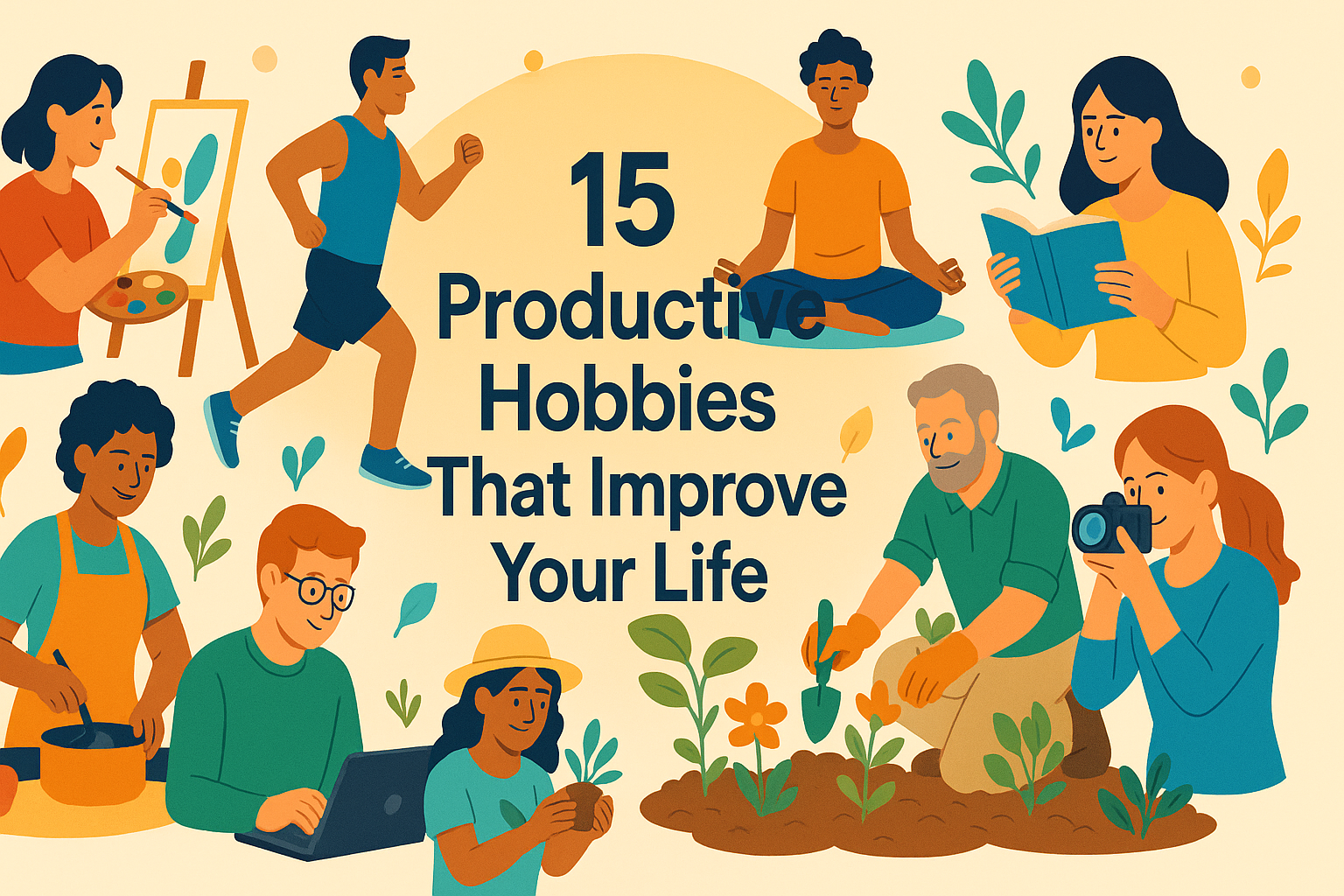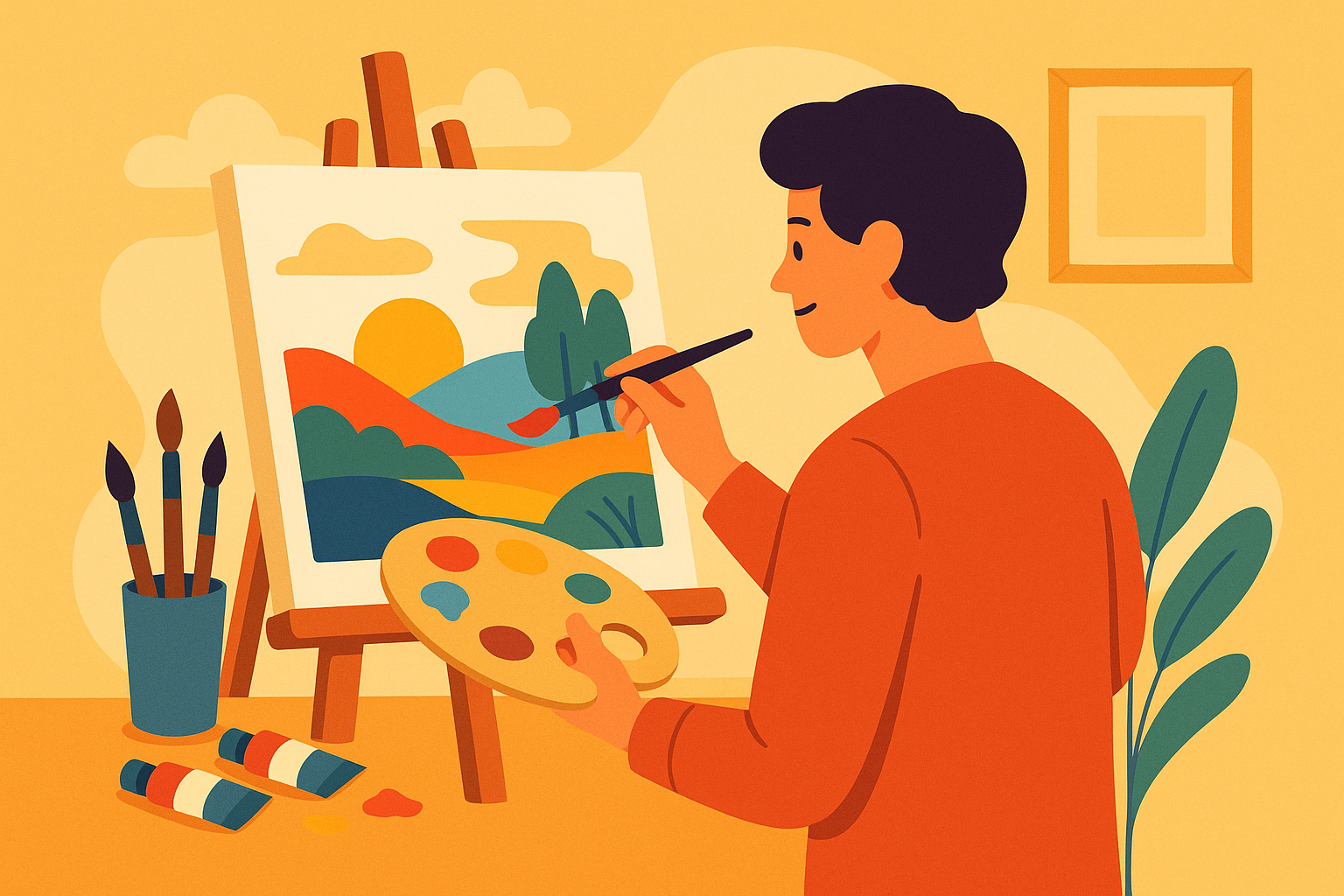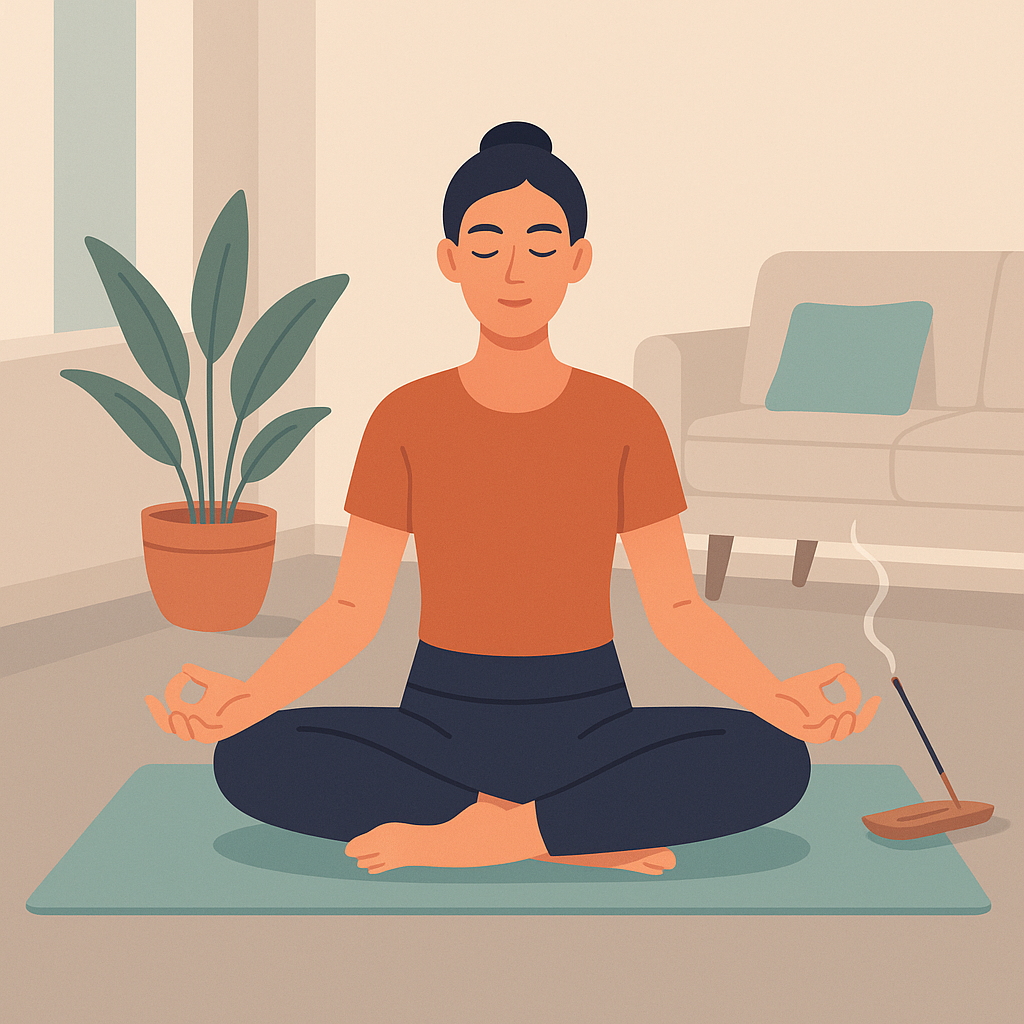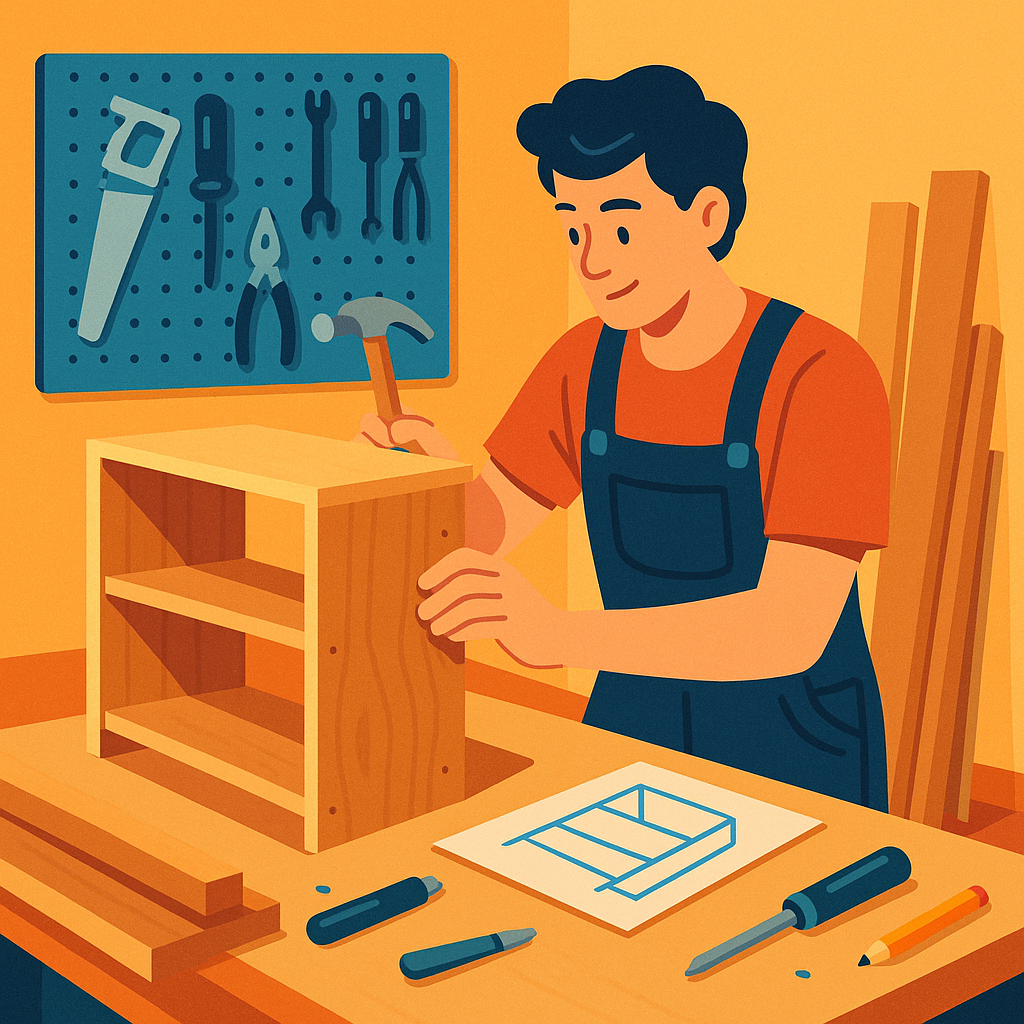
There’s no denying that many of us have a million and one things to do. From bills that need to be cleared to shopping for groceries to fixing the car to taking the kids to shop for new clothes, the list is endless. That’s why it’s good to unwind. In other words, you need a hobby.
And when we talk about hobbies, it doesn’t have to be only about fun. You can have productive hobbies that will help you improve yourself. Now, you might be wondering, “What are productive hobbies?”
We are glad you asked.
We are not referring to activities that will help you get more done in less time. However, many of the hobbies we list here will do just that. Rather, we share useful hobbies that will improve your quality of life.
We are talking about activities that will de-stress you so that you can be happier in life. And when you are happy, you become more productive at work and more successful in life.
You can pick up countless hobbies, but not all of them are constructive. Some only bring pleasure, and at the end of it all, you are left with an empty bank account. Conducting art classes, for example, can be a productive hobby that enhances community engagement and fosters social connections, while simultaneously enriching you.
If finding a productive hobby is something you are interested in, you are in luck because today, we bring you some of the most beneficial hobbies that you can apply to your life right now, and you can even turn them into a second job.
The Benefits of Having a Hobby
Life can sometimes be boring – and demanding, especially if you stick to a daily routine of, let’s say, commuting, getting home to make dinner, then watching TV or browsing social media, and then sleeping. The best way to end such monotony is to find useful hobbies to learn, which can be both healthy and enjoyable, and help balance your professional life with personal responsibilities.
Engaging in certain recreational activities can have certain benefits:
Hobbies Relieve Stress and Improve Mental Health
You might think that adding an activity to your already full schedule can only create more stress. However, you will be surprised to discover that engaging in non-work related activities creates an outlet for releasing stress.
These activities distract you from your personal issues and work, taking away all the negative emotions and feelings. Engaging in hobbies can foster positive emotions and enhance well-being, making you feel more connected and joyful. At the end of it all, your mind feels rejuvenated, relaxed, and ready to take on another day or week.
Hobbies Motivate You to Take a Break
If you’re like many people, especially those working from home, you know how taking a break from work can be a real challenge. However, integrating hobbies into your daily routines gives you something to look forward to – and the more you engage in that hobby, the more likely it becomes a habit.
Let’s say you want to learn Spanish, and you have scheduled a specific time of the day or evening to learn a few sentences. As soon as it’s time, you will want to stop what you’re doing and start your lesson.
Hobbies Give You a Chance to Learn Valuable Skills
When you engage in hobbies, you are not under any pressure to be the best at what you do. Instead, they allow you to have fun while facing new challenges and getting new experiences. Engaging in hobbies can also enhance your problem-solving abilities, which can benefit various areas of your life. Plus, some hobbies give you the rare opportunity of challenging yourself physically – something that you might not be able to achieve at your workplace.
Hobbies Can Create Additional Income
You might find a hobby that you are really good at, and you can turn it into a full-time or part-time job. Nothing gives one more satisfaction than doing what they love and earning some cash while doing it. That’s why passionate people excel in their careers.
For example, photography services can be a way to turn a hobby into a source of income by offering family portraits, covering events, and building a portfolio to attract clients. Leveraging social media can also help promote these services and connect with a wider audience.
Now, with that in mind, the following is a list of hobbies that you can take up. And who knows, your hobby might turn out to be your next big career!
Intellectual Hobbies
Intellectual hobbies are activities that challenge the mind, promote critical thinking, and foster cognitive development. Examples of intellectual hobbies include learning a new language, playing chess, and reading. These hobbies can help improve problem-solving skills, enhance memory, and boost self-confidence. Intellectual hobbies can also provide a sense of accomplishment and fulfillment, as they allow individuals to develop new skills and knowledge. Some of the most productive intellectual hobbies include learning a musical instrument, coding, and creative writing. By engaging in these types of activities, you can improve their mental well-being, develop valuable skills, and enhance your overall quality of life.
1. Painting

Creative hobbies like painting can be a great stress reliever. When you take a brush and start painting a picture, you get immersed in a world of imagination and creativity, subsequently forgetting about your pain and stress.
Painting gives you a different perspective on life – it teaches you not to care about what others think, and to master this skill, you must learn to trust your judgment. Plus, it is the best way to make your emotions and feelings come alive. You can even take painting courses and turn your art into a business.
2. Exercise
Health experts like to remind us how moving our bodies can be beneficial not only for our mental health but also to improve physical fitness. You can choose to take part in a variety of exercises that make you feel good about yourself.
Take running, for instance. It’s one of the recommended ways to de-stress. Whenever you hit the trail, your focus shifts to the beauty of nature, and you won’t be thinking about the negativity surrounding your life.
Plus, running helps you to get in shape and boosts your self-esteem. To help you stay on track of your running progress, check out these running apps for every type of runner.
Exercising, in general, has many benefits:
- Lowering the risk of diabetes and heart disease
- Improving mental health
- Reducing the risk of cancer
- Helping you to lose weight and keep it off
- Improving your sleep quality
- Increasing your lifespan
As you can see, exercising is one of the healthy hobbies that can change your life for the better.
3. Writing

You probably think of writing as a work thing since you often have to write reports, record sales, or create an inventory. But have you ever thought writing can be a hobby – and a productive one?
Well, writing can be good for the soul. Just try it today. Whenever you have thoughts, take a pen and paper (or your phone’s notebook – thanks to technology!) and just write down what’s on your mind. You can pour out all the anger or emotions in your notebook instead of venting your frustration on people – at least the notebook won’t judge you.
You can try your hand at different categories of writing, be it novels, journalism, short stories, ebooks, or blogging, until you find something that really gets you in the mood. Writing allows you to talk to the world through the written word. Additionally, engaging in writing can enhance your writing skills, which can lead to professional benefits such as improved resumes and potential financial opportunities.
4. Cooking
You don’t want to be eating ordinary foods all the days of your life now, do you? If you love food, the time to hone your culinary skills is now.
Nowadays, you don’t even need cookbooks considering all the information you can find online, including cooking videos. You can even master advanced cooking skills without paying for expensive courses.
Baking is especially a useful skill to have, and you can take to making cakes, cookies, muffins, or anything else you fancy. You might even start a baking business and take advantage of the lockdowns to deliver freshly done pastries straight to your clients’ doors.
The thing about cooking is that it will teach you how to plan ahead for meals – a skill that can make you more productive at work. Meal planning can also save money and reduce food waste.
5. Yoga and Meditation

While exercising focuses on your physical fitness, yoga and meditation focus on your mind, mental wellness, spiritual well-being, and memory. Yoga is good for stretching those sore muscles, which is especially beneficial to those who sit in front of a screen all day. It also teaches you how to focus your mind on one thing and feel more connected with your body.
Meditation, on the other hand, helps to improve your focus, and it will leave you energetic throughout the day. Meditating for a few minutes a day also helps to calm your thoughts and gives you positive energy.
6. Photography
You must have taken hundreds of pictures using your phone just for fun. Photography is a fantastic hobby that combines creativity and productivity, allowing you to express your artistic vision and connect with a wider audience through social media. If you like photos a lot, then you probably should turn that hobby into a side hustle and start taking photos of amazing and unique things like landscapes, the sea, your dog or cat, etc.
There are multiple websites, such as Shutterstock, where you can sell your pictures and earn some income. Alternatively, you can take professional photos and create your website where you can sell them.
The good thing about photos is that you don’t have to limit yourself. You can start learning slowly and see where it takes you. We promise it will be worth your time.
7. Graphic Design

Do you always come up with designs, even if they’re just in your head? You might be good at graphic design, a field that significantly enhances your creative skills. Now that everything is going digital, graphic design has become an essential part of marketing and advertising for almost every company.
You can hone your skills for free via Canva, which provides an easy guide for beginners who want to learn about graphic design online. As you progress and start to think about monetizing your skills, Sketch and Adobe Illustrator are some of the best applications to use.
The best part about making graphic design your hobby is that you can do it at home on a freelance contract. And the opportunities are also limitless. From printing designs on t-shirts to printing posters on canvases to creating ads, you can turn your art into a product that people love and buy. Additionally, with a small investment, you can launch a print-on-demand business based on your art.
8. Craft Making and Woodworking

Have you checked out the variety of cool and easy-to-build pieces of furniture on Pinterest? Most of the pieces are made from easily available materials, which you can get cheaply. If you are a handy person and you love to craft items for your house, then you can find very helpful tutorials for woodworking on Wood Magazine.
From bookshelves to foldable tables, you will find almost everything you can think of and how-to guides for building it. Plus, you can make amazing pieces that you can sell to make some extra cash.
And that’s not all. You can take up other crafts like metalworking, knitting, and sewing. One thing that all these crafts have in common is that they enhance your planning skills and teach you to be creative. Additionally, these crafts can significantly improve your observation skills, promoting mental growth and emotional well-being.
9. Reading Books
What could be a better pastime than reading books? It’s like killing two birds with one stone – you entertain yourself and, at the same time, improve your vocabulary and focus. A good book will always be relevant, and it is said that reading can relieve stress, boost happiness, and improve your general health. Additionally, reading can enhance various brain functions, including memory, problem-solving, multi-tasking, and observation skills.
10. Hiking
Who doesn’t love the outdoors? It is always a great feeling to be one with nature, and if you spend most of your hours in the office, exploring nature whenever you get the chance will give you time to clear and refresh your mind.
If you have a thing for long treks, love nature, and want to enjoy its raw beauty, then hiking, as a form of physical activity, might be one of those quintessential weekend hobbies for you.
11. Gardening
Have you ever tried your hand at gardening, one of the most rewarding constructive hobbies? If not, you are missing out on the joy of seeing flowers bloom and plants flourish. Gardening allows you to grow the plants you love, such as mint, thyme, chamomile, and other useful herbs, or design your front or back yard with a beautiful landscape full of flowers.
Gardening teaches you how to manage projects and boosts your creativity. Plus, you can grow fruits and vegetables and sell them to your neighbors or at the local market.
12. Playing an Instrument

What’s that one instrument that you’ve always wanted to play? Take the bold step and start learning today. It has been said that playing a musical instrument makes you smarter and even raises your IQ by up to seven points.
Playing a musical instrument is a wonderful hobby that can bring numerous benefits to one’s physical and mental health. Since it requires a lot of eye-hand coordination, it can improve cognitive function and boost memory. Not only that, but it can also enhance creativity, self-discipline, and self-esteem. Learning to play an instrument requires consistent practice, patience, and dedication, making it an excellent activity for developing valuable skills such as problem-solving, critical thinking, and communication skills.
Additionally, playing an instrument can provide a sense of accomplishment and fulfillment, as well as a creative outlet for self-expression. Whether you’re interested in playing the guitar, piano, or violin, there are many resources available to help you get started, including online tutorials, music classes, and practice apps. By incorporating playing an instrument into your daily routine, you can improve your mental well-being, enhance your cognitive abilities, and enjoy a fun and rewarding hobby.
13. Taking Care of a Pet
Ever wondered why the use of animals is increasingly being adopted in institutions like jails, mental facilities, and nursing homes? It is because scientific studies show that they help humans heal.
If you own a pet, you know how happy they can make you feel. Pets have many benefits, and early studies show that petting your pet can help reduce blood pressure. You see, when you interact with your pet, you create a bond that triggers your brain to release increased levels of oxytocin (the love hormone), making you happier. Pets can have a positive impact on mental well-being by promoting resilience and reducing stress.
Most of us have dogs and cats. But there are other pets, like fish, cockatoos, rabbits, guinea pigs, and even reptiles.
If you are currently unable to get a pet for yourself, you can look into petsitting or volunteering at a shelter. If you love felines, most cities now have cat cafes where you can enjoy some warm drinks and spend some time with cuddly cats.
14. Volunteering
We bet you didn’t think of volunteering as a hobby. But it is an activity that people enjoy doing in their free time. Volunteering is all about helping, and it is always a good feeling knowing that you helped someone in need.
You can offer food items or clothes to the less fortunate or educate them, or you can join a community of volunteers who participate in activities like cleaning up the neighborhood and so on.
What’s more, volunteering gives you a chance to learn new experiences and skills that can be useful on your resume. Additionally, volunteering contributes to personal development by fostering growth, enhancing skills, and promoting overall well-being.
15. Sport
Participating in a new sport or a sport you love is beneficial not only to your brain but also to your muscles. Sports teach you various skills, including coordination, and with practice, you will be able to enhance your response time. Team sports also improve communication, social skills, and leadership skills in addition to being a great way to meet new friends.
More importantly, when you engage in sports you like, you will feel more relaxed, and at the end of it, you’ll be able to think more clearly.
Final Thoughts
Quit wasting your time on Facebook (unless that’s part of your of work) or binge-watching TV and instead try taking up at least one useful hobby to better yourself. Start with what you love, and pick up a constructive hobby that will improve your quality of life. Balancing leisure time with productive activities can enhance your mental well-being and foster social connections. Only you can make it happen.
But to achieve any of that, you first need to create time to learn a new hobby. And one challenge that many people face is time management. Remote workers, particularly, have a hard time separating their work from personal lives. And this can take a toll on your body and leave you tired and unhappy.
That’s why a time tracking app called Traqq was created. It has cool features that make it easy for you to monitor and track your progress throughout the day. The app is highly customizable, and you can track every minute you spend on professional or non-work-related stuff. This way, you can plan your day better and know exactly when to engage in your newfound hobby.
What are the useful hobbies that you’ve learned or are planning to learn? Share your thoughts below.
Frequently Asked Questions
1. What are productive hobbies and why are they important?
Productive hobbies are leisure activities that promote personal growth, improve existing skills, and boost overall happiness. By engaging in creative hobbies—like painting or writing—you de-stress, develop planning skills, and enrich your everyday life.
2. How do productive hobbies improve mental and physical health?
Activities such as yoga, hiking, or playing a musical instrument enhance physical health and mental well-being. Regular exercise lowers stress and boosts self-esteem, while meditation and self-reflection foster greater mindfulness and energy.
3. Can a hobby generate additional income?
Yes. Many of the best productive hobbies—like photography services, graphic design, and craft making—can turn into side businesses. By leveraging various online platforms, you can showcase your work, attract clients, and earn extra income.
4. How can I balance hobbies with a busy schedule?
Allocate free time by planning your day with tools like Traqq’s time tracking app. Scheduling specific “hobby hours” helps you integrate leisure activities into your routine and ensures you have time for personal development without burnout.
5. Which hobbies boost planning and presentation skills?
Craft making, woodworking, and cooking teach you to plan projects step by step and manage resources efficiently. Additionally, volunteering or conducting art classes can sharpen your presentation skills and foster social connections.
6. Are video games considered productive hobbies?
Some video games enhance strategic thinking, problem-solving, and communication skills. Titles focused on resource management or multiplayer collaboration can translate to better planning skills and teamwork in everyday life.
7. How do creative hobbies contribute to personal growth?
Creative ideas—such as writing, painting, or graphic design—encourage you to take risks, trust your judgment, and cultivate self-confidence. Over time, these hobbies foster creative problem-solving and boost self-reflection.
8. Can I learn a new language as a hobby?
Absolutely. Language learning is one of the most productive hobbies for cognitive development and communication skills. Whether you choose online language courses or join a local class, regular practice enhances memory and cultural understanding.
9. What are some productive hobbies for social skill development?
Team sports, volunteering, and group music lessons offer excellent opportunities to build communication skills and social confidence. Working with others in a supportive environment also fosters teamwork and leadership abilities.
10. How do I choose the perfect hobby for me?
Identify your interests and goals—whether it’s physical health, personal growth, or skill development. Experiment with various options (e.g., photography, coding, or gardening) until you find a new hobby that aligns with your passions and modern world lifestyle.
11. Is playing a musical instrument worth pursuing?
Yes. Learning a musical instrument boosts cognitive function, enhances creativity, and can even raise your IQ. Regular practice cultivates discipline, patience, and fine motor skills, making it one of the most productive hobbies.
12. How can I track my progress in a new hobby?
Use a time tracking app like Traqq to log the time you spend on each hobby. By monitoring your leisure activities, you gain insights into which hobbies offer the greatest benefit to your personal development and free time management.


